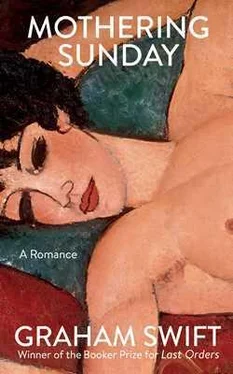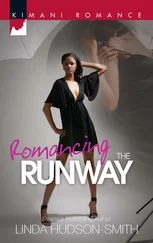And as she watched Ethel open the door she naturally thought of when she had last seen it being opened.
‘Mr Niven—?’ Ethel had mustered, with a mixture of surprise and composure which didn’t begin to embrace the puzzle of why Mr Niven was there with Jane What-was-her-name, the maid from Beechwood.
Were all maids being offered rides today?
And Mr Niven said, ‘You are Ethel, aren’t you?’ Which was also puzzling.
So there had been no need to wait for Ethel. She struggled, later, to imagine what that might have been like. And the whole procedure of informing Ethel took place at the front porch. Since Ethel plainly wouldn’t be told to go in and sit down, not by Mr Niven who wasn’t her own master, even though it was clear from his manner that something really awful might be about to be uttered. And was that Beechwood girl supposed to be coming inside and sitting down too?
Ethel, in fact, suddenly changed. Or perhaps her true Ethelness appeared. She would never know if her (and even Paul Sheringham’s) whole conception of Ethel had been mistaken from the beginning.
Ethel’s eyes, even as Mr Niven was grappling with words again, had suddenly bored into her own as if she, Ethel Bligh, knew everything. Though equally they might have been saying, just as unswervingly, ‘We maidservants have to stick together, don’t we, and know our place in the world?’
Her look went a lot further anyway than a mere bewildered, ‘And what are you doing here? What are you doing consorting with your master?’
Behind Ethel, she could just make out, through the vestibule and the shadows of the hall, the table and the bowl with the white clusters of orchids. It was somehow incredible that they should still be there.
‘I have some distressing news, Ethel,’ Mr Niven began. ‘If I may call you Ethel?’
‘Yes, sir.’
And so Ethel was informed. And stood there, like an unbudging defender on the front porch, as if she were fully prepared, now so much harm had apparently come to this house, to prevent any further assaults upon it. Mr Niven, who was still on the gravel below, seemed to cower before her sudden authority.
‘Then it is just as well, Mr Niven, I came back early, so I can be of assistance. I must have known in my bones something was wrong. That I might be needed. Mr and Mrs Sheringham — they must be quite beside themselves. They must be in such a state again.’ Ethel had said that deliberate ‘again’. ‘I will be here for them when they return. I will inform Cook when she returns. I will take — I will make, if required — any telephone calls.’
‘Ethel—’
But Ethel had carried on, perhaps in rare defiance, for her, of the speak-when-spoken-to rule.
‘I have already tidied around. I have tidied Mister Paul’s room—’
‘That is just the point, Ethel.’
‘The point, Mr Niven?’
‘I need to ask you— I am here to ascertain—’ Mr Niven floundered. ‘Did you find anything, in Mister Paul’s room?’
‘Anything? I don’t know what you mean, Mr Niven.’
‘Like — a note, Ethel. Anything written.’
‘No, sir. I did not find anything written. And I would not have read it if I had, sir.’ Ethel almost looked as if her next words might have been a snappy, ‘Would that be all, sir?’ Or even a, ‘And what business would that be of yours?’
‘Then— That is all right, Ethel. That is all — all right.’
‘Are you all right, sir? Would you be requiring a cup of tea or anything?’
‘No, thank you, Ethel. Are you all right? Would you require — our company? Or Jane here’s company?’
That was a possibility she, the Beechwood maid, hadn’t been prepared for and she waited, surrenderingly, for Ethel’s grasping of the initiative.
‘No, sir. I can manage, thank you.’
But she had said it not looking at Mr Niven, but squarely, unwaveringly at her ‘opposite number’.
And her look was like the look of the sternest and most forgiving of parents.
So, she would never know many things. But she knew now that, certainly by the time the Sheringhams returned, Ethel would have thoroughly ‘tidied up’ Mister Paul’s room. The flung-aside trousers, the bedclothes. The sheets would have been replaced (though no one, Ethel must later have reflected on this, was going to sleep in them), the removed ones bundled into the laundry basket, waiting for Monday’s copper. The kitchen table — a simple kindness to Cook Iris — would have been cleared and cleaned. And everything returned to as it should be. Even though everything was different.
And Ethel would one day find her way into another minor (not so minor) character — in If the Truth Be Known . She would be transmuted and (though only the author would know) honoured by fiction. She would not be called Ethel (she would be called Edith) or be anything like Ethel, or even be a maid, but she would be one of those characters who exist, seemingly, on the periphery of things and yet know everything. And she would be one of those characters whose real ‘character’ goes for most of the time unsuspected and unperceived. But that was a general truth she, the author, would know by then to apply to the creation of character in fiction, as it was a general truth about life and people.
But she would never know exactly how much Ethel had known all along. And she would never know what Ethel did or thought or imagined or felt when she was left alone again in that house in the interval before the Sheringhams (and Cook Iris) returned, and even, in time, the police appeared, just for some routine questions.
She would hardly have composed a thank-you note to her mother.
They drove back. The sun was dipping and turning orange. The afternoon was waning. And crispening. It was only March. Ethel would light fires too, no doubt, among her other tasks. The right thing to do in the circumstances, keep the home fires burning. Just as she herself would do soon, when she became a maid again at Beechwood.
What was she now, for the time being?
Mr Niven said, after a long silence, ‘I’m sorry to have kept you from your reading, Jane. I’m so sorry to have used up your time. What is the book at present? I forget.’
‘It’s all right, sir. It doesn’t matter.’
She was sitting beside him in the front seat, where, when her husband drove, Mrs Niven would sit. She was trying very hard not to weep, to hold herself together.
If only Mr Niven might say, ‘You must take the evening off. You must take a long hot bath.’ But maids never took long hot baths or were given unscheduled evenings off, especially when they had had the day off anyway. In a little while she would have to resume her duties. She would have to be at least as strong as Ethel.
The gathering evening, the apricot light, the gauzy green-gold world, was impossibly beautiful.
After another long silence he said, ‘That’s all five of them, Jane.’
She knew what he meant. She knew exactly what he meant. But she said, ‘Yes, sir,’ in the way that maids simply mouth those words in general concurrence with everything.
Then, when they’d turned into the sweep in front of Beechwood and he’d switched off the engine he suddenly leant across to her and, like a child, wept — blubbed — even pressed his head, his face to her breasts, so that she thought of when she’d pressed them — had it been only this afternoon? — to the opened pages of a book. ‘I’m so sorry, Jane, I’m so sorry,’ he said, even as his face remained where it was. And she said, involuntarily cradling the back of his head, ‘That’s quite all right, Mr Niven, that’s quite all right.’
The book was called Youth —the book she might have read on the bench in the garden, or might have mentioned to Mr Niven when he’d asked. She might have just uttered the odd word ‘youth’.
Читать дальше












